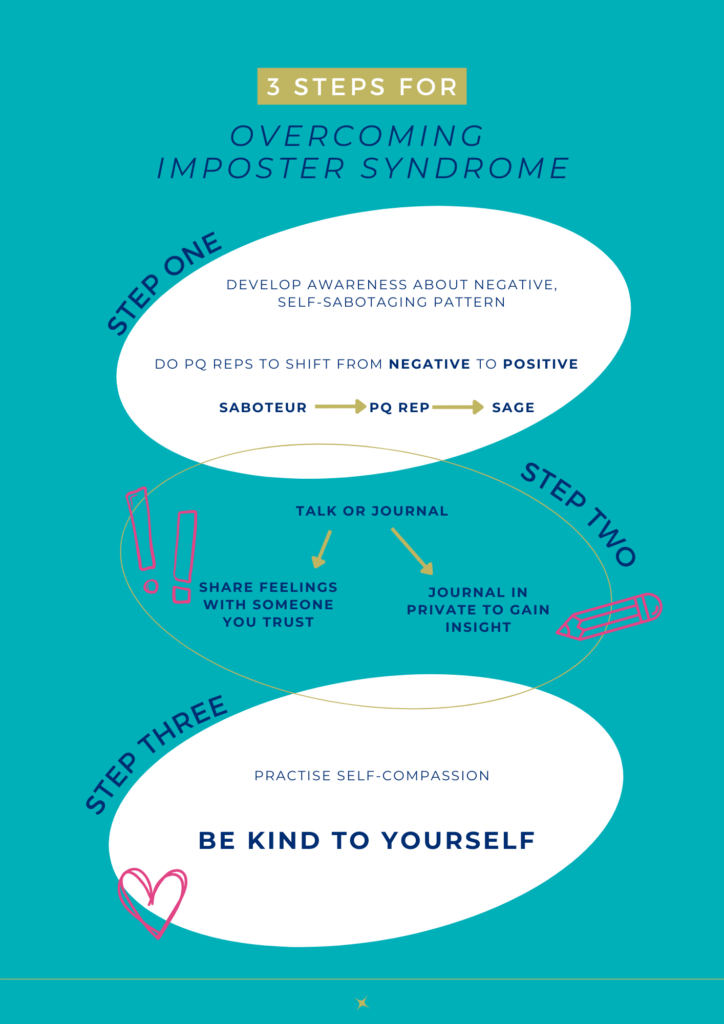Do you experience Imposter Syndrome?
Imposter Syndrome combines thoughts, emotions, and behaviours that can be best described as a form of self-sabotage. You feel inadequate, constantly doubt your abilities, and live with a persistent fear of being exposed as a fraud, despite evidence to the contrary.
Today I’ll share 12 warning signs you may have it. Stick with me afterward because I’ll offer advice on what you can do about it.
Warning Signs of Imposter Syndrome
Thoughts
- Constant Self-Doubt: You question whether you deserve your accomplishments even when they are objectively successful.
- Attributing Success to Luck: You believe that your achievements are solely the result of luck or external factors.
- Perfectionism: You fixate on getting everything right, which can lead to burnout.
- Self-Criticism: You have an inner critic – saboteur – that regularly informs you that you are not good enough.
Emotions
- You Feel Inauthentic: You have a persistent feeling of being a “fraud” regardless of your qualifications and achievements.
- Comparing Yourself to Others: You constantly evaluate yourself against others and feel inferior.
- Anxiety: You experience chronic anxiety about your performance and the expectations others have of you.
Behaviours
- Avoiding Evaluation: You dislike performance appraisals or assessment tools, even when you have a positive history with them vis-à-vis personal insight or external recognition.
- Fear of Failure: You hate making mistakes and are afraid of failing to the point of avoiding challenges.
- Overworking: You work exceptionally hard to offset your perceived inadequacies.
- Discounting Praise: You minimize compliments and positive feedback, rejecting them as insincere.
- Deflecting Attention: You redirect attention away from your achievements and often recognize others instead.
What to Do About It
Step 1: Self-Awareness about Negativity
Recognize that you are experiencing impostor syndrome. By acknowledging these thoughts, feelings, behaviours, you take the first step to overcoming The Imposter.
With self-awareness, you can challenge the negativity behind all these warning signs. In coaching, I share the PQ method for transitioning from negative to positive. Consider that all negativity is fear-based, saboteur energy. Its opposite is positivity, grounded in love, which is called sage in PQ language. You can also call this positive energy your Leader Within, Voice of Inner Wisdom, and Inner Being.
To move from saboteur to sage, that is, from negative to positive, you do a PQ rep. Examples of PQ reps include:
- box breathing;
- rubbing two fingertips against one another with such delicacy that you can feel the fingertip ridges on both fingers;
- focusing your eyes on a point mid-distance and then close up.
The great part is, you only need 10 seconds to navigate this transition (unless you’re experiencing a saboteur hijacking) and you can do it anywhere, including the middle of a meeting.

Step 2: Talk or Journal
Depending on your preference, you may want to talk about Imposter Syndrome or keep a journal. Some people prefer to share their feelings with people they trust. Others prefer writing it down – in private – to gain insight.
I’ve done both to deal with negative self-talk, subject to the situation. Click here for a kick-start to journalling.
Step 3: Practise Kindness to Yourself
Most importantly, be kind to yourself. When you become kind to yourself you can demonstrate it to others. By practising self-compassion, you will build confidence and overcome self-doubt. I know you can do it and that, when you’re willing to make a change, you’ll do so.
Start with self-awareness, do PQ reps, reinforce learning with talking or journalling, and be kind.
Imposter Syndrome, be gone!

Header Photo by Allef Vinicius on Unsplash

